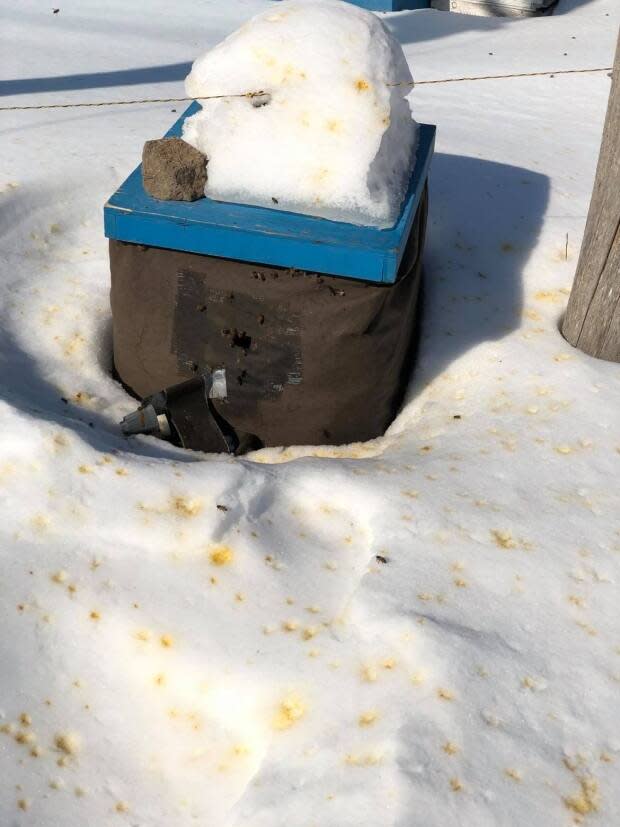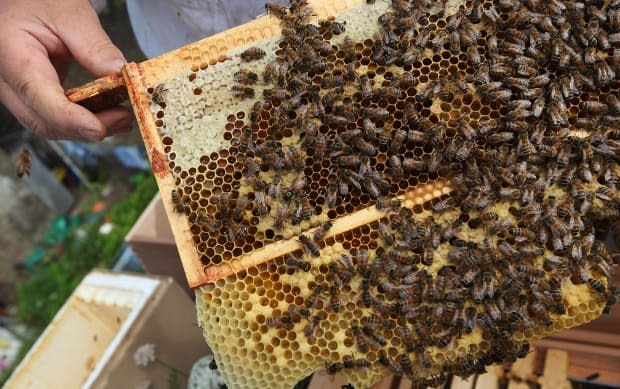How do you solve a problem like bee feces? Quispamsis thinks it has an answer

Some residents of Quispamsis are not happy about nuisance bee poop, and now the town is poised to adopt a bylaw to deal with it.
After a couple of years of research, planning and tweaking, final reading and approval are expected April 18, said Jennifer Jarvis, planning technologist with the southern New Brunswick town of about 18,800 people.
"In the off-chance that there's a rogue beekeeper … there's something in the bylaw that the residents can rely on," she said.
The town's issue with bee poop was publicized in the summer of 2021, after complaints were received about yellow deposits of "processed pollen" preventing a small number of homeowners from enjoying their backyards.

"The amount of feces that was found on their outdoor patio furniture, for example — it was constantly barraged … and so that did impact their quality of life," said Jarvis.
"They said, 'If it was a dog or a cat we could call somebody and something could be done.'"
Jarvis was asked to look into the issue.
'Bathroom breaks,' but for bees
One of the things she learned, in consultation with local beekeepers, is that the properties in question seemed to be on the path for the bees when they took "cleansing flights," the bee equivalent of bathroom breaks.
It's especially noticeable in spring, said Chris Maund, apiarist with the New Brunswick Department of Agriculture.
"In the spring, they've been holding it in for months," he said, and "they will all go out and defecate at once."
Bees spend all winter huddled in a sphere-shaped cluster inside their hive to keep warm, said Maund, and they don't defecate that entire time.
"On a warm spring day, when it's probably above 15 C at least, they will fly out and they will relieve themselves" and usually leave a small yellow spot on the snow or on objects, he said.
Maund doesn't think they have a preferred type of spot to do so.
"It's wherever they feel like going. If there's snow on the ground, you'll see it on snow."
The properties in Quispamsis that have been getting bombed with bee poop are situated between Ritchie Lake and about 12 beehives.
Some beekeepers suggested that adding a water source to the hive property might solve the problem, said Jarvis.
Maund wouldn't speculate about that, having not seen the particular location, nearby structures or research about water sources attracting bees.
Hive limit in residential areas
In any case, Quispamsis has included in its proposed bylaw a requirement for a water source — such as a bird bath or kiddie pool — but it is also opting for broader rules that would apply to all hobby beekeepers.
There would be a limit of four hives in residential areas, a minimum yard size of 1,140 square metres and a requirement to register with the New Brunswick Beekeepers Association.
That's required by provincial legislation, said Jarvis, so that bees can be monitored for viruses and mites and be protected.
The latest version of the bylaw has been modified in several ways from the original proposal, said Jarvis.
Beekeepers were originally going to have to apply to the planning advisory committee, which costs $300. Town staff now say they think they can handle it in house.
A requirement for liability insurance was also removed because it was impossible to find a company to provide it. Commercial beekeepers can get insurance against the loss of hives, but if a person gets stung by a bee, it's pretty much impossible to prove where the bee came from, she said.

And the maximum number of hives was increased from two to four for properties zoned R1, which are regular residential neighbourhoods. Jarvis said that's to accommodate summer growth and give the bees a better shot at surviving winter.
A section was also added to define what would make the bees a "nuisance."
Basically, the beekeeping can't interfere with a neighbour's enjoyment of their property. If it does, they have grounds to file a complaint at town hall.
The town will work with beekeepers to sort out any issues and keep them in compliance, said Jarvis.
"No one ever wants anything to end up in court. But ultimately that could be an avenue."
The proposed bylaw is getting good reviews.
"Two of the residents that we've heard from have spoken at the public hearing, and they were very happy that the provision about the nuisance was placed in there," said Jarvis.
"I just tried to balance it for everyone," she said.
The New Brunswick Beekeepers Association could not be reached for comment by publication time.


